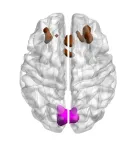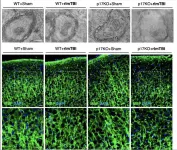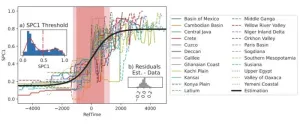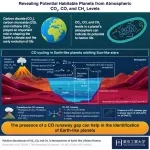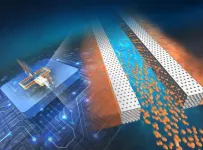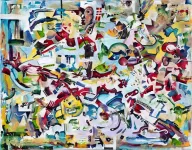(Press-News.org) PHOENIX, Feb. 6, 2024 – Eleven scientists leading the way in stroke research will be recognized during the American Stroke Association’s International Stroke Conference 2024 for their exceptional professional achievements. The meeting will be held in Phoenix, Feb. 7-9, and is a world premier meeting for researchers and clinicians dedicated to the science of stroke and brain health.
The illustrious group of awardees includes four groundbreaking scientists who have devoted their careers to stroke research and six scientists will be recognized for their notable new research. The awards include the Ralph L. Sacco Outstanding Stroke Research Mentor Award, which honors Ralph L. Sacco, M.D., M.S., FAHA, a past president of the American Heart Association and American Stroke Association, who passed away in January 2023.
The 2024 honorees are:
Bernadette Boden-Albala, M.P.H., Dr.P.H., University of California, Irvine, who will receive the Edgar J. Kenton III Lecture Award.
Steven Warach, M.D., Ph.D., Dell Medical School at The University of Texas at Austin, who will receive the David G. Sherman Lecture Award.
James F. Meschia, M.D., FAHA, Mayo Clinic in Jacksonville, Florida, who will be honored with the William M. Feinberg Award for Excellence in Clinical Stroke.
Marc I. Chimowitz, M.B., Ch.B., Medical University of South Carolina, who will receive the Ralph L. Sacco Outstanding Stroke Research Mentor Award.
Louise D. McCullough, M.D., P.H.D., McGovern Medical School at UTHealth Houston, who will be awarded the Thomas Willis Lecture Award.
·Takuma Maeda, M.D., Ph.D., Barrow Neurological Institute in Phoenix, who will receive the Mordecai Y.T. Globus New Investigator Award, for a research abstract.
Raed Joundi, M.D., D.Phil., McMaster University in Hamilton, Ontario, Canada, who will receive the Vascular Cognitive Impairment Award for research being presented at the meeting.
Oriana Sanchez, M.D., University of Texas, Houston, who will receive this year’s Robert G. Siekert New Investigator Award in Stroke for a research abstract.
·Mohammed Abdelsaid, R.P.H., Ph.D., Mercer University School of Medicine, Savannah, Georgia, who will receive the Stroke Basic Science Award for a research abstract.
Shumei Man, M.D., Ph.D., FAHA, Cleveland Clinic in Ohio, who will receive the Stroke Care in Emergency Medicine Award for research being presented at the meeting.
Susan Linder, P.T., D.P.T., Ph.D., Cleveland Clinic in Ohio, who will be awarded the Stroke Rehabilitation Award for a research abstract.
Bernadette Boden-Albala, M.P.H., Dr.P.H., the winner of the Edgar J. Kenton III Lecture Award, is the director and founding dean of the University of California, Irvine’s Program in Public Health and future School of Population and Public Health. With more than two decades of research experience, Boden-Albala is an internationally recognized expert in the social epidemiology of chronic disease whose research has focused on eliminating health disparities through defining and intervening on social support, structural and institutional barriers to optimal health. Her areas of expertise include community-based participatory research, health equity, stroke and cardiometabolic health disparities. She has led numerous large, multi-site studies utilizing community-based participatory research methods in urban and rural communities across the United States and globally, as well as large community health assessment, evaluation, capacity building and workforce training projects. The Edgar J. Kenton III Lecture Award recognizes lifetime contributions to the investigation, management, mentorship and community service in the field of racial and ethnic stroke disparities or related disciplines. Boden-Abala will present her Edgar J. Kenton III lecture, “A Roadmap for Health Equity: Understanding the Importance of Community-Engaged Research,” at 10:18 a.m. MT, Tuesday, Feb. 6.
Steven Warach, M.D., Ph.D., the recipient of the David G. Sherman Lecture Award, is a professor of neurology at Dell Medical School at The University of Texas at Austin, where he is executive director of the Seton Dell Medical School Stroke Institute and also serves as the regional stroke director for Ascension Texas. Warach is known for his seminal contributions in magnetic resonance imaging of stroke. He earned his Ph.D. in psychology-neuroscience from Michigan State University and M.D. from Harvard Medical School, where he completed his neurology residency. The Sherman Award honors David G. Sherman, M.D., a prominent stroke physician and an internationally recognized leader and researcher in stroke prevention and treatment. The award recognizes lifetime contributions to the investigation, management, mentorship and community service in the stroke field. Warach will present his lecture, “Improving Stroke Diagnosis and Treatment: A Journey Toward the End of Time,” at 11:32 a.m. MT, Wednesday, Feb. 7.
James F. Meschia, M.D., FAHA, the awardee of the William M. Feinberg Award for Excellence in Clinical Stroke, is professor of neurology and chair emeritus of the department of neurology at Mayo Clinic in Jacksonville, Florida. Meschia is certified by the American Board of Psychiatry and Neurology (ABPN) in neurology and vascular neurology. Meschia is a pioneer in the study of inherited risk factors for ischemic stroke and has had a longstanding commitment to providing the latest evidence for carotid revascularization as a means for stroke prevention. He was the inaugural medical director of the first Joint Commission-certified stroke center within the Mayo Clinic Foundation, and he has authored or co-authored over four hundred peer-reviewed publications. The William M. Feinberg Award for Excellence in Clinical Stroke is named for the prominent stroke clinician-researcher and American Heart Association volunteer who contributed to a more comprehensive understanding of the causes of stroke. The award recognizes significant contributions to the investigation and management of clinical research in stroke. Meschia’s lecture, “Asymptomatic Carotid Stenosis: Current and Future Considerations,” will be presented at 11:03 a.m. MT, Thursday, Feb. 8.
Marc I. Chimowitz, M.B., Ch.B., the recipient of the Ralph L. Sacco Outstanding Stroke Research Mentor Award is professor emeritus of neurology at the Medical University of South Carolina in Charleston, South Carolina. His main career interests are in improving treatments for patients with intracranial arterial atherosclerosis and helping to mentor the next generation of clinical and translational scientists.The Ralph L. Sacco Outstanding Stroke Research Mentor Award recognizes outstanding achievements in mentoring future generations of stroke researchers in the field of cerebrovascular disease. Chimowitz will present his lecture, “Mentoring Clinical Stroke Researchers in Challenging Times,” at 11:34 a.m. MT, Thursday, Feb. 8.
Louise D. McCullough, M.D., P.H.D., FAHA, the winner of the Thomas Willis Lecture Award, is the Roy M. and Phyllis Gough Huffington Distinguished Chair of Neurology at McGovern Medical School; chief of neurology at Memorial Hermann Hospital-Texas Medical Center and co-director of UTHealth Neurosciences, all in Houston. McCullough is a physician-scientist and a practicing vascular neurologist with clinical expertise in sex/gender disparities, the microbiome, stroke and aging, and acute stroke treatments. A renowned investigator, she is well recognized for her work in cerebral vascular disease and is known for her research identifying sex differences in cell death pathways during stroke, which have now been shown to be a major factor in the response to ischemic insult. The Thomas Willis Award recognizes contributions to the investigation and management of stroke basic science. McCullough’s lecture, “Aging, Sex, and Stroke: The Three Amigos of Brain Misadventures,” will be presented at 11:03 a.m. MT, Friday, Feb. 9.
Takuma Maeda, M.D., Ph.D., the Mordecai Y.T. Globus New Investigator Award in Stroke awardee, is a postdoctoral fellow at Barrow Aneurysm & AVM Research Center (BARRC) at the Barrow Neurological Institute in Phoenix. This award recognizes Globus’ major contributions to research in cerebrovascular disease and his outstanding contributions to the elucidation of the role of neurotransmitters in ischemia and trauma; the interactions among multiple neurotransmitters; mechanisms of hypothermic neuroprotection; and the role of oxygen radical mechanisms and nitric oxide in brain injury. Maeda’s award-winning presentation, Abstract 15, “Pharmacological Activation of Efferocytosis Prevents Intracranial Aneurysm Rupture,” will be presented at 7:30 a.m. MT, Wednesday, Feb. 7.
Raed Joundi, M.D., D.Phil., is the Vascular Cognitive Impairment Award recipient. He is an assistant professor at McMaster University, an adjunct scientist at the Institute for Clinical Evaluative Sciences (ICES) and an investigator at the Population Health Research Institute, a joint institute of McMaster University and Hamilton Health Sciences, all in Hamilton, Ontario, Canada. The Vascular Cognitive Impairment Award encourages investigators to undertake or continue research or clinical work in the field of vascular cognitive impairment and submit an abstract to the International Stroke Conference. Joundi’ s award-winning presentation, Abstract 67, “Risk and Time-Course of Post-Stroke Dementia: A Population-Wide Cohort Study, 2002-2022,” will be presented at 7:30 a.m. MT, Thursday, Feb. 8.
Oriana Sanchez, M.D, the winner of the Robert G. Siekert New Investigator Award in Stroke, is currently completing a vascular neurology fellowship in the department of neurology at the University of Texas in Houston. The Siekert New Investigator Award in Stroke recognizes Robert G. Siekert, M.D., who was the founding chairman of the American Heart Association’s International Conference on Stroke and Cerebral Circulation, now known as the International Stroke Conference. The award encourages new investigators to undertake or continue stroke-related research. Sanchez’s award-winning presentation, Abstract 1, “Overcoming Clinical Trial Enrollment Challenges by Monitoring EMS Radio Transmissions: Pre-Hospital Screening of Acute Ischemic Stroke Patients,” will be presented at 7:30 a.m. MT, Wednesday, Feb. 7.
Mohammed Abdelsaid, R.P.H., Ph.D., the recipient of the Stroke Basic Science Award, is an assistant professor at Mercer University School of Medicine in Savannah, Georgia. The Stroke Basic Science Award recognizes outstanding basic or translational science that is laboratory-based. Abdelsaid’s winning presentation, Abstract 17, “SARS-CoV-2 Spike Protein Exacerbates Thromboembolic Cerebrovascular Complications in Humanized ACE2 Mouse Model,” will be presented at 7:54 a.m. MT, Wednesday, Feb. 7.
Shumei Man M.D., Ph.D., FAHA, the Stroke Care in Emergency Medicine Award awardee, is a neurologist at the Cleveland Clinic and stroke center director of Cleveland Clinic Fairview Hospital in Ohio. The Stroke Care in Emergency Medicine Award encourages investigators to undertake or continue research in the emergent phase of acute stroke treatment and submit an abstract to the International Stroke Conference. Man’s winning presentation, Abstract 43, “Race-Ethnic Specific Trends in Stroke Thrombolysis Care Metrics in Relation to U.S. Target: Stroke Nationwide Quality Improvement Program 2003-2021,” will be presented at 2:00 p.m. MT, Wednesday, Feb. 7.
Susan Linder P.T., D.P.T., Ph.D., the Stroke Rehabilitation Award recipient, is director of clinical research for the department of physical medicine and rehabilitation at the Cleveland Clinic in Ohio. The Stroke Rehabilitation Award encourages investigators to undertake or continue research and/or clinical work in the field of stroke rehabilitation. Linder’s winning presentation, Abstract TMP28, “Forced-Rate Aerobic Cycling Enhances Motor Recovery in Persons With Chronic Stroke: A Randomized Clinical Trial,” will be presented at 6:15 p.m. MT, Thursday, Feb. 8.
Statements and conclusions of studies that are presented at the American Heart Association’s scientific meetings are solely those of the study authors and do not necessarily reflect the Association’s policy or position. The Association makes no representation or guarantee as to their accuracy or reliability. Abstracts presented at the Association’s scientific meetings are not peer-reviewed, rather, they are curated by independent review panels and are considered based on the potential to add to the diversity of scientific issues and views discussed at the meeting. The findings are considered preliminary until published as a full manuscript in a peer-reviewed scientific journal.
The Association receives funding primarily from individuals; foundations and corporations (including pharmaceutical, device manufacturers and other companies) also make donations and fund specific Association programs and events. The Association has strict policies to prevent these relationships from influencing the science content. Revenues from pharmaceutical and biotech companies, device manufacturers and health insurance providers and the Association’s overall financial information are available here.
Additional Resources:
Multimedia is available on the right column of the release link https://newsroom.heart.org/news/11-leading-stroke-scientists-to-receive-american-stroke-association-honors?preview=98f6690f8cf04d6db6b2fad604d549c7
ASA’s International Stroke Conference 2024 Online Program Planner
For more news at ASA International Stroke Conference 2024 follow us on X @HeartNews
###
About the American Stroke Association
The American Stroke Association is devoted to saving people from stroke — the No. 2 cause of death in the world and a leading cause of serious disability. We team with millions of volunteers to fund innovative research, fight for stronger public health policies and provide lifesaving tools and information to prevent and treat stroke. The Dallas-based association officially launched in 1998 as a division of the American Heart Association. To learn more or to get involved, call 1-888-4STROKE or visit stroke.org. Follow us on Facebook, X.
END
11 leading stroke scientists to receive American Stroke Association honors
American Stroke Association International Stroke Conference 2024
2024-02-06
ELSE PRESS RELEASES FROM THIS DATE:
Powerful answers to energy questions may be blowing in the wind
2024-02-06
While wind farms have become a widely popular method of generating energy, researchers are now looking at the impact of these large farms on wind patterns and the surrounding environment.
Using large-scale simulations to better understand the way air moves across and within wind farms, researchers from UBC Okanagan and Delft University of Technology (TU Delft) in the Netherlands have developed a modelling framework that will help improve wind energy forecasts and productivity.
The researchers also hope to learn how large wind farms can alter natural wind patterns.
“Wind farms are getting so large that ...
Discover BMB announces exciting lineup of speakers
2024-02-06
Be front and center for the hottest research findings in the molecular life sciences at Discover BMB, the annual meeting of the American Society for Biochemistry and Molecular Biology, to be held March 23–26 in San Antonio.
Don’t miss this opportunity to hear from the top minds in the field. Reporters are invited to register for a complimentary press pass to attend #DiscoverBMB in San Antonio or access press materials electronically. Please note that only a limited number of complementary on-site press passes will be issued, so advance registration is recommended. Find more information in the #DiscoverBMB newsroom.
As part of an exciting program spotlighting the ...
Study finds strongest evidence to date of brain’s ability to compensate for age-related cognitive decline
2024-02-06
Scientists have found the strongest evidence yet that our brains can compensate for age-related deterioration by recruiting other areas to help with brain function and maintain cognitive performance.
As we age, our brain gradually atrophies, losing nerve cells and connections and this can lead to a decline in brain function. It’s not fully understood why some people appear to maintain better brain function than others, and how we can protect ourselves from cognitive decline.
A widely accepted notion is that some people’s brains are able to compensate ...
How T cells combat tuberculosis
2024-02-06
LA JOLLA, CA—La Jolla Institute for Immunology (LJI) is working to guide the development of new tuberculosis vaccines and drug therapies.
Now a team of LJI scientists has uncovered important clues to how human T cells combat Mycobacterium tuberculosis, the bacterium that causes TB. Their findings were published recently in Nature Communications.
"This research gives us a better understanding of T cell responses to different stages in tuberculosis infection and helps us figure out is there are additional diagnostic ...
Drug could protect brains from damage after concussions
2024-02-06
Repeat concussions, also referred to as repetitive mild traumatic brain injury, can lead to chronic traumatic encephalopathy (CTE) and raise the risk of Alzheimer’s disease. However, some people who experience repetitive mild traumatic brain injury never develop major disease. Onder Albayram and colleagues investigated the role of a protein known as p17 in protecting brains from long-term pathologies. In stressed neurons, p17 initiates production of C18-Ceramide, a bioactive sphingolipid that acts as a label of damaged mitochondria in neuronal axons. Labelled mitochondria are then detected and removed by autophagosomes. The authors knocked out p17 in mice. Some p17-knockout ...
Is there a typical rate of cultural evolution?
2024-02-06
Are cultural evolution rates similar across human societies? The emerging field of Cliodynamics uses mathematical models to study history. Tobias Wand and colleagues used a data-driven approach to estimate the rates of cultural evolution in 23 geographic areas, using data from Seshat: Global History Databank, which records nine “complexity characteristics” for 370 polities over 10,000 years, ending in the nineteenth century. The complexity characteristics are polity population; extent of polity territory; the size of the largest urban center; hierarchical complexity; the ...
Last chance to get hotel discounts for the world’s largest physics meeting
2024-02-06
Next month, scientists from around the world will convene to share new results from across the physical sciences in nearly 11,000 individual presentations. The American Physical Society’s (APS) March Meeting will be held in person in Minneapolis and online everywhere March 3-8.
Discounted hotel rates are available for in-person attendees at select Minneapolis hotels near the Minneapolis Convention Center. Book your hotel by Feb. 9 to receive the discount.
Press Registration
News media with valid APS press credentials may register for the meeting at no cost. To request press credentials, visit APS’s online newsroom. Registration ...
Newly discovered carbon monoxide-runaway gap can help identify habitable exoplanets
2024-02-06
The search for habitable exoplanets involves looking for planets with similar conditions to the Earth, such as liquid water, a suitable temperature range and atmospheric conditions. One crucial factor is the planet's position in the habitable zone, the region around a star where liquid water could potentially exist on the planet's surface. NASA's Kepler telescope, launched in 2009, revealed that 20–50% of visible stars may host such habitable Earth-sized rocky planets. However, the presence of liquid water alone does not guarantee a planet’s habitability. On Earth, ...
Pore power: high-speed droplet production in microfluidic devices
2024-02-06
Over the past two decades, microfluidic devices, which use technology to produce micrometer-sized droplets, have become crucial to various applications. These span chemical reactions, biomolecular analysis, soft-matter chemistry, and the production of fine materials. Furthermore, droplet microfluidics has enabled new applications that were not possible with traditional methods. It can shape the size of the particles and influence their morphology and anisotropy. However, the conventional way of generating droplets in a single microchannel structure is often slow, ...
How a city is organized can create less-biased citizens
2024-02-06
The city you live in could be making you, your family, and your friends more unconsciously racist. Or, your city might make you less racist. It depends on how populous, diverse, and segregated your city is, according to a new study that brings together the math of cities with the psychology of how individuals develop unconscious racial biases.
The study, published in the latest issue of Nature Communications, presents data and a mathematical model of exposure and adaptation in social networks that can help explain why there is more unconscious, or implicit, racial bias ...
LAST 30 PRESS RELEASES:
ASU researchers to lead AAAS panel on water insecurity in the United States
ASU professor Anne Stone to present at AAAS Conference in Phoenix on ancient origins of modern disease
Proposals for exploring viruses and skin as the next experimental quantum frontiers share US$30,000 science award
ASU researchers showcase scalable tech solutions for older adults living alone with cognitive decline at AAAS 2026
Scientists identify smooth regional trends in fruit fly survival strategies
Antipathy toward snakes? Your parents likely talked you into that at an early age
Sylvester Cancer Tip Sheet for Feb. 2026
Online exposure to medical misinformation concentrated among older adults
Telehealth improves access to genetic services for adult survivors of childhood cancers
Outdated mortality benchmarks risk missing early signs of famine and delay recognizing mass starvation
Newly discovered bacterium converts carbon dioxide into chemicals using electricity
Flipping and reversing mini-proteins could improve disease treatment
Scientists reveal major hidden source of atmospheric nitrogen pollution in fragile lake basin
Biochar emerges as a powerful tool for soil carbon neutrality and climate mitigation
Tiny cell messengers show big promise for safer protein and gene delivery
AMS releases statement regarding the decision to rescind EPA’s 2009 Endangerment Finding
Parents’ alcohol and drug use influences their children’s consumption, research shows
Modular assembly of chiral nitrogen-bridged rings achieved by palladium-catalyzed diastereoselective and enantioselective cascade cyclization reactions
Promoting civic engagement
AMS Science Preview: Hurricane slowdown, school snow days
Deforestation in the Amazon raises the surface temperature by 3 °C during the dry season
Model more accurately maps the impact of frost on corn crops
How did humans develop sharp vision? Lab-grown retinas show likely answer
Sour grapes? Taste, experience of sour foods depends on individual consumer
At AAAS, professor Krystal Tsosie argues the future of science must be Indigenous-led
From the lab to the living room: Decoding Parkinson’s patients movements in the real world
Research advances in porous materials, as highlighted in the 2025 Nobel Prize in Chemistry
Sally C. Morton, executive vice president of ASU Knowledge Enterprise, presents a bold and practical framework for moving research from discovery to real-world impact
Biochemical parameters in patients with diabetic nephropathy versus individuals with diabetes alone, non-diabetic nephropathy, and healthy controls
Muscular strength and mortality in women ages 63 to 99
[Press-News.org] 11 leading stroke scientists to receive American Stroke Association honorsAmerican Stroke Association International Stroke Conference 2024
